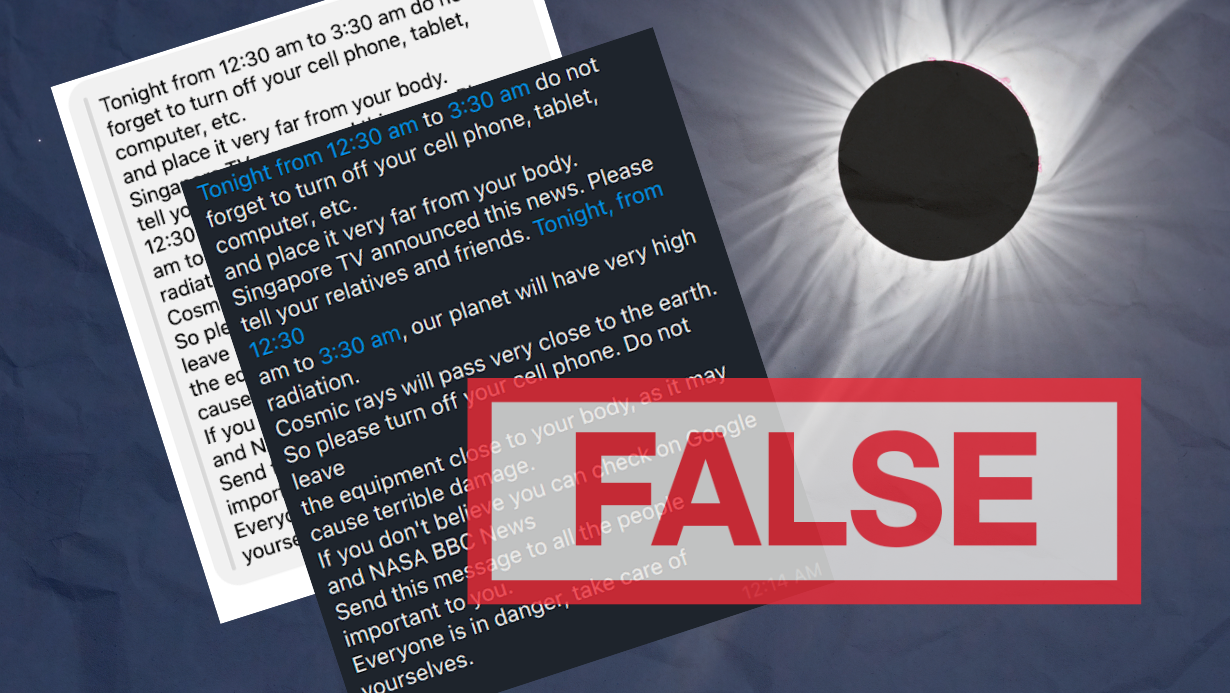
Hoax messages claiming that harmful cosmic rays were set to pass close to earth have circulated anew, coinciding with a rare total solar eclipse in North America.

Claim: Harmful cosmic radiation set to pass close to earth
Rating: FALSE
Hoax messages claiming that harmful cosmic rays were set to pass close to earth have circulated anew, coinciding with a rare total solar eclipse in North America on April 8, 2024.
PressOne.PH monitored the reappearance of these messages in Viber and Facebook messenger groups over the weekend.
The false messages have been recycled over and over, this time attributed to Singaporean television, the British Broadcasting Corp. (BBC), and the United States’ National Aeronautics and Space Administration or NASA.
PressOne.PH fact-checked these hoax messages, attributed to broadcaster Kim Atienza and the BBC last year, and rated them false.
According to the International Atomic Energy Agency, cosmic radiation is a normal occurrence and is no cause for worry.
Moreover, the earth has protection from cosmic rays, and even airline passengers receive insignificant exposure, it said.
“The Earth is shielded by a magnetic field that makes the charged particles bounce from pole to pole, creating two gigantic donut-shaped belts populated by energetic electrons and protons. The magnetosphere deflects cosmic rays and protects us from solar flares,” the agency said in a 2021 article on its website.
“Sometimes, cosmic radiation does reach us, but without creating any harm, just like other low levels of radiation we are regularly exposed to,” it added.
In an article on its website, NASA had likewise explained that earth is protected from solar and cosmic radiation by magnetic fields and radiation belts.
Only if people travelled farther from earth’s protective shields would they be “exposed to the full radiation spectrum and its damaging effects.”
Keyword searches did not yield new advisories from Singaporean television or the BBC.
NASA did come up with advice on X (formerly Twitter) but only about damage to smartphone sensors pointed directly to the sun during an eclipse. Felipe F. Salvosa II
PressOne.PH is a verified signatory of the Code of Principles of the International Fact -Checking Network (IFCN) at Poynter. The code of principles of the International Fact-Checking Network is a series of commitments organizations abide by to promote excellence in fact-checking. We believe nonpartisan and transparent fact-checking can be a powerful instrument of accountability journalism..
PressOne.PH believes that fact-checking is essential to combating misinformation and disinformation, and in informing and educating citizens and voters. Read more of PressOne.PH’s Fact-Checking Policy by clicking here.
The public is welcome to send feedback or requests for fact-checks at factcheck@pressone.ph.
If you believe PressOne.PH is violating the Code of Principles of the International Fact-Checking Network (IFCN), you may submit a complaint directly to the IFCN website: https://ifcncodeofprinciples.poynter.org/complaints-policy
